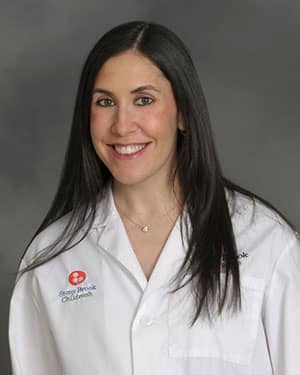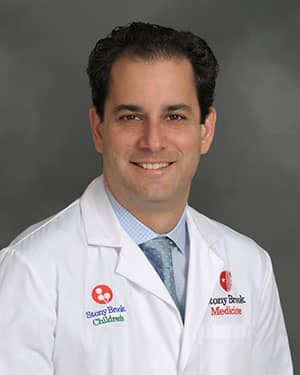Navigation Celiac Disease and Gluten Sensitivity Center
Celiac Disease and Gluten Sensitivity Center
The Celiac Disease and Gluten Sensitivity Center is the only center on Long Island specializing in the comprehensive diagnosis and treatment of children with celiac disease and gluten sensitivities.
The specialty center is built on the foundation of more than a decade’s experience of treating children with celiac disease and has been designed to meet the growing incidence of the disease in Suffolk and Nassau counties. It brings all our expertise into one place so that patients and families can receive comprehensive and accessible services that include diagnosis, treatment, management and support.
Services
We take a multidisciplinary, whole child approach, which means that we not only treat the disease or the gluten sensitivity, but every aspect of your child’s health — the physical, social and emotional aspects of the disease.
Celiac disease can be difficult to diagnose because symptoms vary greatly and may be similar to other diseases. It can present along a wide spectrum, which is why the center also works with children with gluten sensitivities.
At the center, we use several diagnostic approaches. One is a simple blood test to check for the presence of antibodies that may indicate gluten intolerance. This is a quick and painless procedure, and can be done on an outpatient basis at a laboratory.
If further testing is needed, the doctor may perform an upper endoscopy. This is a minimally invasive procedure in which a doctor uses a slender tube inserted through the mouth to take a tiny sample of the small intestine for further examination. Your child will be asleep throughout and will awaken with no memory of the procedure or lingering aftereffects.
Pediatric endoscopy is performed at the endoscopy center at Stony Brook University Hospital. A dedicated team of pediatric anesthesiologists and nurses will provide anesthesia and care for your child during the procedure.
If celiac disease or a gluten sensitivity is confirmed, you and your child will meet with a registered dietitian for a nutrition evaluation and education session. Although new therapies are under investigation, currently the only treatment for celiac disease is to remove all gluten from your child’s diet. In fact, the gluten-free diet will help to heal the damage to the small intestine over time.
During these sessions, we will work closely with you to put these new dietary guidelines into action. This includes comprehensive lists of what your child can eat and what is toxic to their system, shopping guidelines, how to read labels for hidden gluten, recipes and strategies for eating at restaurants. We can also coach you on how to talk with teachers, other parents and your child’s friends about their food requirements, as well as how to integrate a gluten-free sensibility into your family’s day-to-day lives.
We will give you all the support your family needs, as well as refer you to community resources and other specialties if necessary.
In the long term, we will follow your child through adulthood, doing routine assessments, plus periodic nutritional analysis, dietary intake and laboratory screenings. These routine assessments will ensure that your child is receiving optimal nutrition benefits from his or her diet, with an additional focus on growth and optimizing bone health. Because people with celiac disease need to follow a gluten-free diet for life, we will stay connected with your child, helping them stay on course as they grow and their taste and nutrition requirements evolve.
It may sound difficult to completely change your child or your family’s diet, but keep in mind that this treatment is extraordinarily safe for your child, involving no surgical intervention, medications and side effects.
Our Team
Our team is comprised of board-certified pediatric gastroenterologists (physicians who specialize in diseases of the digestive tracts of children) and includes highly trained nurse practitioners as well as a registered dietitian. A registered dietitian is particularly important because treatment of celiac disease revolves around making dietary changes, which includes educating families and children on food choices, sharing eating strategies and recipes, reviewing shopping tips and providing ongoing support.
Supporting Specialists
In some children, celiac disease may affect other body systems or other aspects of their health. Because we take an approach that supports the total health of your child, we make the following experts available to you if needed. They also become part of your child’s care team.
These supporting specialties include:
Location
Celiac Disease and Gluten Sensitivity Center
Stony Brook Children’s
Phone: (631) 444-8115
Fax: (631) 444-6045
For appointments, call (631) 444-KIDS (5437).
Frequently Asked Questions
Typically, children and adolescents will be tested for celiac disease if they have persistent diarrhea and failure to thrive. Other symptoms include abdominal pain, abdominal distention, bloating, constipation, unexplained anemia, vomiting, anorexia, loss of subcutaneous fat, symptoms consistent with irritable bowel syndrome and delayed puberty.
Children with certain medical conditions, including dermatitis herpetiformis, Down Syndrome, immunoglobin A (IgA) deficiency, Type I diabetes, Turner syndrome, hypothyroidism, dental enamel defects and Williams syndrome, may also have a greater prevalence of celiac disease.
Yes, changing to a gluten-free diet takes some work, but experts at Stony Brook’s Celiac Disease and Gluten Sensitivity Center will support you during this transition. We can help you with everything from recipes and reading labels to restaurant strategies.
That is a legitimate concern, but also something the team can help you with. Remember, children are remarkably adaptable, and once they understand what they can and cannot eat, they tend to follow through because they feel so much better and no longer get sick all the time. However, birthday parties and other social occasions can sometimes be challenging. The key is planning ahead. We help you find ways to talk to other parents in advance about your child’s dietary needs, find substitutions for traditional celebratory foods and give you other tips for navigating these kinds of situations.
Dietary Guidelines
Label Reading
Learning to read labels is one of the most important strategies in ensuring a gluten-free diet. If a product contains wheat, it will be clearly stated. You also need to watch for rye and barley ingredients, unless they are labeled as gluten free.
See the accompanying lists for what to avoid:
Grains to Avoid
Wheat:
- Atta
- Bulgur
- Couscous
- Durum
- Einkorn
- Emmer
- Farina
- Fu
- Graham flour
- Hydrolyzed wheat protein
- Kamut
- Matzo, matzo meal
- Modified wheat starch
- Seitan
- Semolina
- Spelt/dinkel/faro/faro
- Triticale
- Wheat bran, flour, germ or starch
Barley:
- Ale
- Barley
- Beer
- Brewer’s yeast
- Lager
- Malt
- Malt extract/malt syrup/malt flavoring
- Malt vinegar
- Malted milk
Rye:
- Rye bread
- Rye flour
Hidden Gluten Sources
- Broth
- Candy
- Communion wafers
- Imitation bacon/seafood
- Lipstick/lip gloss/lip balm
- Luncheon meats
- Marinades and thickeners
- Medications (check with your pharmacist)
- Sauces
- Soup bases
- Soy sauce
- Vitamin and mineral supplements
Allowed Grains
- Amaranth
- Arrowroot
- Buckwheat (100%)
- Corn bran, corn flour
- Cornmeal
- Cornstarch
- Flax
- Legume flours (bean, chickpea, lentil, pea)
- Mesquite flour
- Millet
- Montina flour
- Nut flours
- Potato flour
- Potato starch
- Oats/oat flour (gluten-free)
- Quinoa
- Rice bran/rice flours
- Rice polish
- Sago
- Sorghum flour
- Soy flour
- Sweet potato flour
- Tapioca
- Taro
- Teff
- Wild rice
Safe Additives and Ingredients
- Baker’s yeast
- Caramel coloring
- Maltodextrin
- Modified food starch (except wheat)
- Monosodium glutamate (MSG)
- Starches (except wheat)







